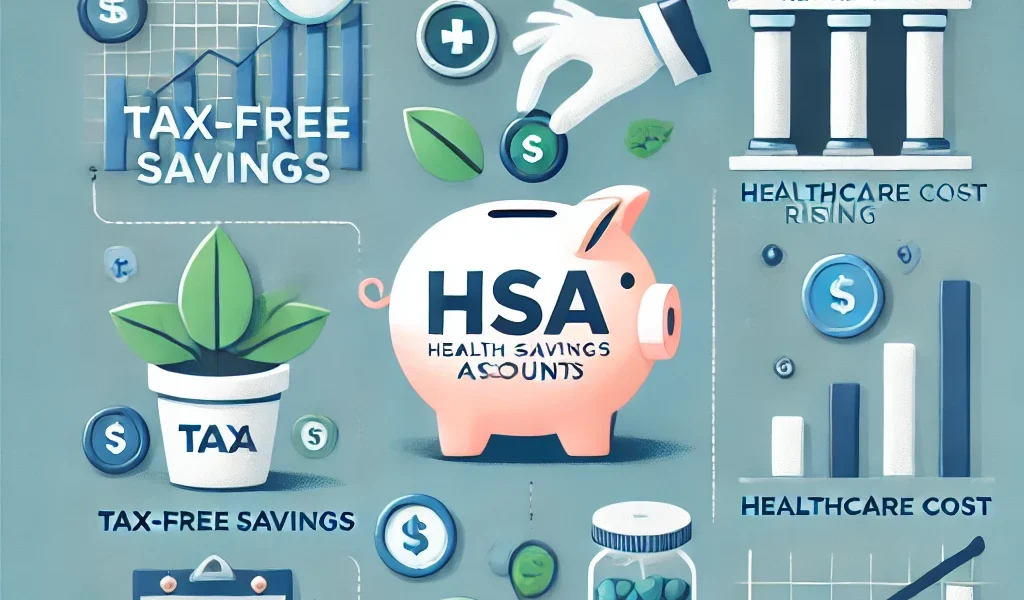The Role of Health Savings Accounts (HSAs) in Retirement Planning – Which One Offers the Best Returns?
Introduction
Retirement planning is not just about building a solid nest egg; it’s also about managing future healthcare expenses. One of the most underutilized yet powerful tools for retirement is the Health Savings Account (HSA).
An HSA is a tax-advantaged savings account designed to help individuals cover medical expenses, but its benefits extend far beyond immediate healthcare costs. With triple tax advantages, investment opportunities, and flexibility for retirement, HSAs can play a crucial role in maximizing retirement savings and long-term financial security.
In this blog, we’ll explore:
✔ How HSAs work
✔ Their role in retirement planning
✔ Strategies to maximize their benefits
✔ How HSAs compare to traditional retirement accounts
What Is a Health Savings Account (HSA)?
An HSA is a tax-advantaged account that allows individuals to save money specifically for medical expenses. To qualify for an HSA, you must be enrolled in a high-deductible health plan (HDHP).
Key Features of HSAs:
✔ Tax-Free Contributions – Contributions are made pre-tax, reducing taxable income.
✔ Tax-Free Growth – The money grows tax-free, just like an IRA or 401(k).
✔ Tax-Free Withdrawals – Funds can be withdrawn tax-free for qualified medical expenses.
✔ No Required Minimum Distributions (RMDs) – Unlike 401(k)s and IRAs, there’s no requirement to withdraw funds at a certain age.
✔ Investment Options – Many HSAs allow funds to be invested in stocks, ETFs, and mutual funds, increasing potential long-term returns.
How HSAs Benefit Retirement Planning
While HSAs are primarily known for covering medical expenses, they offer long-term advantages that make them a powerful retirement savings tool.
1. HSAs Cover Rising Healthcare Costs in Retirement
✔ Medical expenses increase with age, and retirees often spend a significant portion of their income on healthcare.
✔ According to Fidelity, an average 65-year-old couple retiring today will need about $300,000 for medical expenses in retirement.
✔ An HSA can be used tax-free to cover Medicare premiums, long-term care, and other health-related costs.
💡 Tip: Save and invest in your HSA early to build a strong fund specifically for healthcare needs.
2. HSAs Have Triple Tax Advantages
HSAs offer a unique tax structure that makes them more powerful than other retirement accounts:
| Tax Benefit | HSA | 401(k) | Roth IRA |
|---|---|---|---|
| Contributions | Pre-tax | Pre-tax | After-tax |
| Growth | Tax-free | Tax-deferred | Tax-free |
| Withdrawals for Medical Expenses | Tax-free | Taxable | Tax-free |
✔ No other retirement account offers all three tax benefits like an HSA does!
3. HSAs Can Be Used as a Stealth Retirement Account
✔ After age 65, HSA funds can be withdrawn for any reason without penalty.
✔ Non-medical withdrawals are taxed just like a 401(k) or IRA withdrawal.
✔ This makes an HSA a flexible backup retirement account if medical expenses are lower than expected.
💡 Tip: If you have sufficient retirement savings elsewhere, let your HSA funds grow tax-free and use them strategically later in life.
4. HSAs Offer Investment Growth Opportunities
✔ Many HSA providers allow funds to be invested in mutual funds, ETFs, and stocks.
✔ Investing HSA funds rather than keeping them in cash can significantly increase long-term growth.
💡 Example:
If you contribute $3,850 per year (2024 limit for individuals) and invest it with an 8% annual return, your HSA could grow to over $300,000 in 30 years!
5. No Required Minimum Distributions (RMDs)
✔ Unlike 401(k)s and traditional IRAs, there’s no requirement to withdraw funds at a certain age.
✔ This allows for greater control over retirement withdrawals and long-term tax planning.
💡 Tip: Use your HSA strategically by keeping it invested until you need it for medical expenses in retirement.
How to Maximize Your HSA for Retirement
✅ 1. Contribute the Maximum Amount
For 2024, the HSA contribution limits are:
✔ $3,850 for individuals
✔ $7,750 for families
✔ $1,000 catch-up contribution for those age 55+
💡 Tip: Contribute the maximum every year and invest for long-term growth.
✅ 2. Invest Your HSA Funds
✔ Many people leave their HSA funds in cash, but investing provides higher returns.
✔ Choose low-cost index funds or ETFs for steady growth.
💡 Tip: Keep only a small portion in cash for immediate medical expenses and invest the rest.
✅ 3. Delay Withdrawals for Maximum Growth
✔ Unlike FSAs (Flexible Spending Accounts), HSA funds don’t expire.
✔ Pay for current medical expenses out-of-pocket and let your HSA continue to grow.
✔ Save receipts and reimburse yourself later, allowing more time for tax-free growth.
💡 Tip: Save medical receipts for decades and withdraw a lump sum later for a tax-free reimbursement boost!
✅ 4. Use HSA Funds for Medicare & Long-Term Care
✔ HSA funds can cover:
- Medicare Part B, C, and D premiums
- Long-term care insurance
- Qualified out-of-pocket medical expenses
💡 Tip: An HSA helps cover rising healthcare costs in retirement without tax penalties.
How HSAs Compare to Other Retirement Accounts
| Feature | HSA | 401(k) | IRA | Roth IRA |
|---|---|---|---|---|
| Tax-Free Contributions | ✅ | ✅ | ✅ | ❌ |
| Tax-Free Growth | ✅ | ❌ | ❌ | ✅ |
| Tax-Free Withdrawals | ✅ (Medical) | ❌ | ❌ | ✅ |
| No RMDs | ✅ | ❌ | ❌ | ✅ |
💡 Key Takeaway: An HSA is the only account that offers all three tax benefits, making it a powerful addition to your retirement strategy.
Final Thoughts: Why an HSA Should Be Part of Your Retirement Plan
✔ HSAs provide tax-free savings for healthcare costs, ensuring financial security in retirement.
✔ Triple tax advantages make HSAs superior to many other retirement accounts.
✔ Investing HSA funds allows for long-term wealth accumulation.
✔ No required withdrawals mean you can strategically use HSA funds later in life.
By using an HSA strategically, you can boost your retirement savings and ensure you’re financially prepared for future healthcare expenses.
Disclaimer:
This article is for informational purposes only and does not constitute financial or legal advice. Please consult a financial advisor before making investment decisions.




